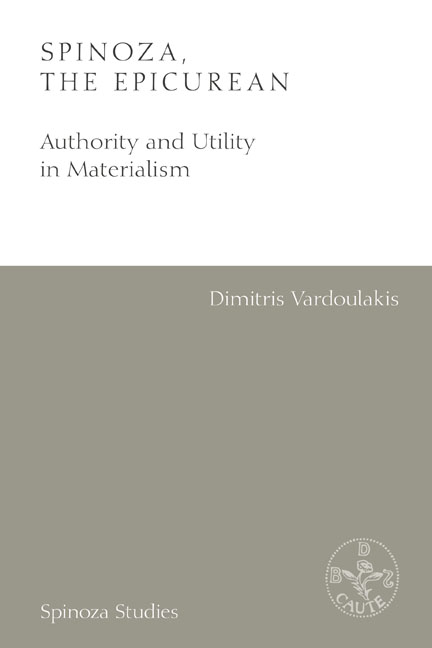Book contents
- Frontmatter
- Contents
- Reference Guide to Spinoza’s Work
- Acknowledgements
- Dedication
- Preamble
- Introduction: Why is Spinoza an Epicurean?
- 1 Freedom as Overcoming the Fear of Death: The Dialectic of Authority and Utility in the Preface
- 2 The Power of Error: Moses, the Prophets and the People (chapters 1, 2 and 3)
- 3 Philonomianism: Law and the Origin of Finitude (chapter 4)
- 4 Political Monism: The Primacy of Utility over Authority (chapters 5 and 6)
- 5 Love your Friend as Yourself: The Neighbour and the Politics of Biblical Hermeneutics (chapters 7 to 13)
- 6 The Freedom to Philosophize: The Two Paths to Virtue (chapters 14 and 15)
- 7 Fear and Power: Natural Right and Authorization in Spinoza and Hobbes (chapter 16)
- 8 Theocracy: On the State of Authority (chapters 17 and 18)
- 9 The Authority to Abrogate: The Two Paths to Virtue and the Internal Enemy (chapters 19 and 20)
- Conclusion: The Limitation of Spinoza’s Epicureanism
- Bibliography
- Index
7 - Fear and Power: Natural Right and Authorization in Spinoza and Hobbes (chapter 16)
Published online by Cambridge University Press: 20 October 2020
- Frontmatter
- Contents
- Reference Guide to Spinoza’s Work
- Acknowledgements
- Dedication
- Preamble
- Introduction: Why is Spinoza an Epicurean?
- 1 Freedom as Overcoming the Fear of Death: The Dialectic of Authority and Utility in the Preface
- 2 The Power of Error: Moses, the Prophets and the People (chapters 1, 2 and 3)
- 3 Philonomianism: Law and the Origin of Finitude (chapter 4)
- 4 Political Monism: The Primacy of Utility over Authority (chapters 5 and 6)
- 5 Love your Friend as Yourself: The Neighbour and the Politics of Biblical Hermeneutics (chapters 7 to 13)
- 6 The Freedom to Philosophize: The Two Paths to Virtue (chapters 14 and 15)
- 7 Fear and Power: Natural Right and Authorization in Spinoza and Hobbes (chapter 16)
- 8 Theocracy: On the State of Authority (chapters 17 and 18)
- 9 The Authority to Abrogate: The Two Paths to Virtue and the Internal Enemy (chapters 19 and 20)
- Conclusion: The Limitation of Spinoza’s Epicureanism
- Bibliography
- Index
Summary
There is a distinctive change of tone in chapter 16 – the first chapter of the third part of the Theological Political Treatise. It is as if Spinoza suddenly becomes more direct, freer and bolder. He notes that ‘up to this point our object has been to separate philosophy from theology and to show that the latter allows freedom to philosophise for every individual’. This is the task that is announced as ‘finalized’ in chapter 14, and yet, as we saw, it is not finalized in the sense that faith and reason are separated; rather they are distinguished yet interminably entangled. This is the conclusion of a trajectory that includes the critique of personal authority in the first part of the Treatise, as well as the development in the second part of Reformed authority that is no longer opposed to the calculation of utility. Then, Spinoza explains what he intends to do in this third part: ‘It is therefore time to enquire what are the limits of this freedom of thought, and of saying what one thinks, in a well-conducted state.’ This part, then, will present the double sense of agonism that pertains to the freedom to philosophize, as we saw in the previous chapter, that is, the agonism against any false sense of meaning that promotes personal authority, and the transversal or chiasmus between the two paths that lead to the good and virtue. The latter, in particular, will be the focus of the third part. Spinoza further indicates how he will accomplish this task: ‘To approach this question in an orderly way, we must discuss the basis of the state, and prior to that … we must discuss the natural right of the individual’ (172). The first concern, then, is natural right.
Spinoza immediately proceeds to define right in terms of power. First, this definition is articulated in terms of nature: ‘Nature's right is co-extensive with its power [jus naturae eo usque se extendere, quo usque ejus potentia se extendit]’ (173/189). And then in terms of individuals: ‘the right of the individual is co-extensive with its determinate power [determinata potentia]’ (173/189).
- Type
- Chapter
- Information
- Spinoza, the EpicureanAuthority and Utility in Materialism, pp. 232 - 262Publisher: Edinburgh University PressPrint publication year: 2020



